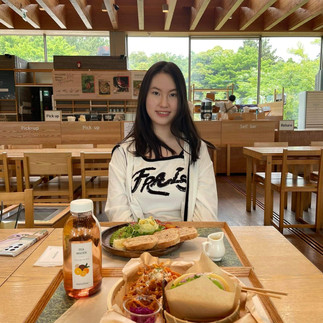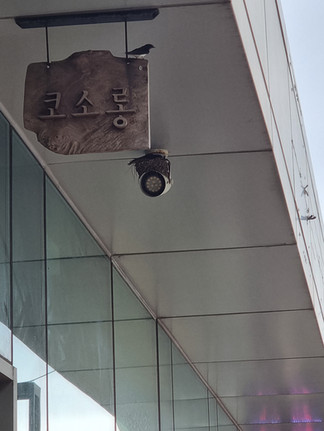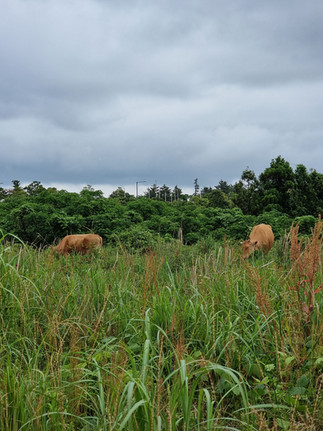Final Days on Jeju
- Elisha Bae
- Jun 18, 2022
- 7 min read
I've booked a flight to Seoul which will take place pretty soon and most of the things I'll need when I get there are already in boxes, ready to be shipped. As I'm writing this, I look around and I see quite an empty room which is the only thing that actually makes me acknowledge the fact that I am going to be leaving this place pretty soon.
There are a few things that I'd like to talk about in order to wrap up my time here on this beautiful tropical island.
1. Arts Week Literary Salon
One of my favorite activities during Arts Week (the week before the school breaks off for the summer holiday) was the Literary Salon I participated. I was invited by one of my favorite English teachers two months before it actually happened and I'm glad that my optimistic mind said yes because if he had asked me now, I might have said no, just because I didn't want to wake up early to come into school.
There weren't many people there, which is, unfortunately, what happens when you have the word 'literature' in the title of the event. I'm not saying that the students at my school aren't up for a scholarly discussion about literature, but I'm not not saying that they'll sign up for it enthusiastically (except for the handful of people who are genuinely interested) when it takes place.
I wasn't sure what to expect -- it was a three-hour event with lectures and discussions, loosely based around this year's Arts Week theme, Changing Reality. There was a new concept that got thrown around quite a lot. The literary canon. As someone who is quite familiar with jargons of fandoms and fanfiction, I thought it sort of translated to 'source material', but the lectures made me understand it better in a more academic context.
To explain it briefly, the literary canon is a list of books that have been influential and important enough to be used as a measure of quality when put against other books. The majority of the discussion revolved around the question, "who puts together the literary canon?", which was an open-ended issue. There have been voices of concern that this subjective list of the literary canon has not always been representative of what the world thinks of as being essential.
One of the guest speakers, a professor at the University College of San Diego, brought up the fact that people can create a literary canon on a more personal level. As a professor, he told us that sometimes, he sees the need to change up the literary canon that he is given. This is because after talking with his students, he often realizes that the one he prepared does not encompass what the students think is important.
I feel like this should have been its own post but I'm going to continue anyway. I came too far to stop here. For a round-table discussion part of the event, we got into smaller groups and talked about technology and its influence on literature. I personally don't like mixing the two together (as in eBooks), but I did point out my love for text adventure stories and that the company Choice of Games is known for having authors write 400,000-word stories (which is double the length of The Fellowship of the Ring) and make it possible for users to play the story as an active character that makes decisions. One of the teachers also pointed out that with technology, analysis of the vocabulary density — the ratio of the number of words in a text to the number of unique words in the same text. This may be used as an indicator of the complexity, and therefore quality, of the work.
I came out of the room feeling accomplished and my mind completely stimulated by the ideas we talked about. It's a shame that not a lot of people will know about this, but to an extent, I think the small number made it possible to bring out the very essence of the discussions.
2. Cafés in Jeju
Jeju is known for the plethora of cafes that are scattered all over the island and it's very easy to find one on the map or stumble across an aesthetically pleasing one that has great options for dessert or brunch. But there are three cafes that I went to, which have left me with fond memories.
→ Mano Coffee House: This one stuck with me because I learned so much about coffee. My friends have always been coffee fanatics, recharging their caffeine in every Starbucks store they can find. I've tried coffee a few times but I just didn't like it. The bitter aftertaste and the watery, burnt smell were not my thing. So when I sought out this place on the map, it was for the sake of my parents, not me.
But when the employee started teaching us the history of coffee making and how the popular coffee shops nowadays don't go through the painstaking steps of sorting the good coffee beans from the moldy ones and other impurities, I found myself intrigued. And when he presented my parents with the coffee they ordered and I tried a sip, I was completely dumbfounded. The taste wasn't just bitter -- in fact, it wasn't bitter at all! From the naturally-dried type, I could taste the sweetness of apricots, plums, peaches, cherries, you name it. And the washed type, the earthy aftertaste made it feel like I was drinking barley tea.
They prided themselves on creating the best setting for the roastery, not burning the beans completely, and also taking a few hours of their time every day to pick out the impurities from the batch they harvest. If this is what coffee is supposed to be, I could get used to it.
→ Osulloc: This place became very popular a few years after I started going to school in Jeju and it's often overflowing with tourists. I don't like going there most of the time because of the sheer amount of waiting you need to do to get a drink or a piece of cake. Yet, there is a portion of it that I love.
In a separate building, Osulloc initiates tea brewing lessons, using Korean traditional tea sets. They start with the history of tea and take you to a beautiful building where everything is set up so that you can get first-hand experience of brewing Osolluc's signature green tea.
The whole process is very calming and I always get excited to drink the tea that I made because it tastes different every single time. I must really like getting to know the history/theory behind the art of brewing coffee and tea, judging by what I wrote above 😂
→ Pengohoda: The name looks quite unusual because they used the Jeju dialect, which, if you don't know, is almost like a different language compared to standard Korean. It means 'comfortable' and I felt just that when I stepped into the cafe.
It wasn't big at all, but the décor was laid out perfectly. I don't think my photos do justice to the cozy atmosphere. Another thing that made this cafe special was that they made vegan/gluten-free desserts, meaning that my mom and I could both enjoy them. Also, the design of these cakes was so pretty that I seriously contemplated whether I could eat them or not (though that contemplation didn't last that long).
This cafe got me excited about baking again and provided me with inspiration on how I could use different ingredients to create vegan/gluten-free dessert that looks and tastes amazing.
3. Packing my things
For a good two months, I packed everything that I owned. We came to Jeju with so little but we needed over 50 boxes to pack all the belongings. In the process of packing, I ended up getting rid of a lot of things and giving out some of my old textbooks and stationery items. I found the slight emptiness to be something enjoyable. In Seoul, I'm going to have more things that I don't use anymore (I haven't organized my room in Seoul in years) and I hope that I can bring the emptiness there as well. I also found a newfound talent -- wrapping objects in bubble wrap :D
We buy so many things that we're not going to be using efficiently. I'm all for buying stuff (I can never get enough of notebooks and pens) but only if it's of actual use. I'm also guilty of going on shopping sprees to get more things than I need. Packing for college (and living in a dorm) will hopefully help me put a limit on just buying essential things.
4. Taking a walk around town
Something that I'm going to thoroughly miss is the evening walks that I had with my mom. Ever since I was done with my IB exams, we would take a stroll around town, often stopping by the grocery store to get things for our meals the next day.
It got longer and longer and now we usually walk for about an hour. We even have a go-to course that we follow but it never gets boring because there's always something new to see. Nature's funny like that. The photos below are some of nature's little surprises that we encountered during our walks. We saw calves indulging themselves on the grass by the sidewalk, birds perched on unexpected places, little baby birds being fed by their parents, and ants... So. Many. Ants. The endless conversations made the time go by so quickly -- though sometimes that was pleasantly interrupted by bumping into someone we know.
▲ such a nonchalant calf, taking its time to enjoy munching on the grass
I was never one to like 'walking' as a means of working out just because it's something we do every day, but doing it with a purpose and with someone else definitely makes a difference. I'm just thankful for the good weather and the beautiful landscape that made the walks even better. I hope I can continue doing it in Seoul.
Things are going to be quite different in Seoul, especially since I haven't lived there for more than a month and a half during the summer holidays. It'll come with new elements to get used to, but for now, I'll take some more time to treasure the memories of Jeju, which I'll definitely come back to in the near future. It's just a part of who I am!












































